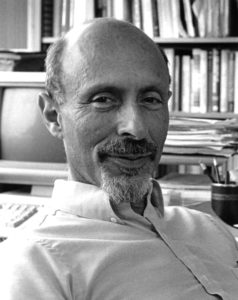Edward Greenberg, professor emeritus of economics who taught and conducted research at Washington University in St. Louis for more than five decades, died Aug. 24, 2016, at his home in University City. He was 80.

Greenberg, a well-respected scholar of Bayesian econometrics and dynamic macroeconomics, joined the university in 1963 as an assistant professor of economics in Arts & Sciences. A full professor from 1969 to 2005, he taught courses in econometrics and microeconomic theory and advised dozens of doctoral students.
In 1995, he co-published a seminal article in the American Statistician that hastened the spread of powerful Bayesian statistical techniques to many fields, including statistics, engineering, biostatistics, ecology, economics, business and political science.
Written with Siddhartha Chib, his longtime co-author and Harry C. Hartkopf professor of Econometrics and Statistics at Olin Business School, the paper has been cited more than 3,000 times and stands as a fitting legacy to Greenberg’s rich and productive research career.
“Ed had a genuine enthusiasm for research,” Chib said. “It was always inspiring to have him around and witness his dedication to scholarly work. He was an exemplary individual, calm of mind and demeanor. He made us better in all dimensions.”
Greenberg earned a doctoral degree in economics in 1961 from the University of Wisconsin-Madison, and taught there as an assistant professor before joining Washington University. He was a Ford Foundation Faculty Fellow in 1965-66 and had been a visiting professor at the University of Warwick (U.K.), Technion-Israel Institute of Technology and the University of Bergamo (Italy).
At Washington University, he held several key administrative posts, including chair of the Department of Economics (1969-72) and chair of the Faculty Senate Council. He won the Burlington-Northern Award for Teaching in 1990.
Greenberg’s popular text book, “Introduction to Bayesian Econometrics,” first published in 2008, was recently released in a second edition by Cambridge University Press. He also co-authored four other books: “Wages, Regime Switching, and Cycles” (1992); “The Labor Market and Business Cycle Theories” (1989); “Advanced Econometrics” (1983, revised 1991); and “Regulation, Market Prices, and Process Innovation” (1979).
In his last decade as an emeritus professor, Greenberg remained active in research, publishing several papers and an edited book on macroeconomic instability. At the time of his retirement, the Edward Greenberg book prize was established through gifts from his students, colleagues, friends and family and is awarded annually to an outstanding undergraduate economics student.
“To me, Ed epitomized the wise professor,” said Steven Fazzari, the Bert A. and Jeanette L. Lynch Distinguished Professor of Economics. “He was a dedicated teacher and an insightful scholar who was respected for his competence and integrity. He was a trusted leader who guided the department in fruitful directions, but more important to me, he was a role model, known for the sage advice, warm friendship and loyal support he gave to all of his colleagues.”
Greenberg is survived by his daughter, Lisa Greenberg of University City and four grandchildren. He was preceded in death by his wife, Joan, who worked at Washington University for 26 years, mostly in student affairs in the Department of Biology in Arts & Sciences, and died in 2005. His son, Arthur, a 1982 graduate, died in 2010.
A funeral service will be held at 1:30 p.m. Sunday, Aug. 28, at Congregation B’nai Amoona, 324 South Mason Rd. St. Louis, Mo., 63141.
Contributions may be made to Siteman Cancer Research, B’nai Amoona or a favorite charity.